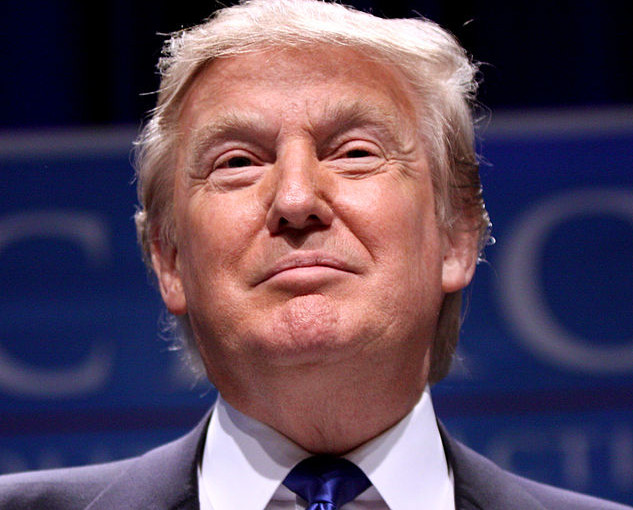
WASHINGTON—If elected president, Donald Trump has pledged to scrap a work visa program that brings 300,000 student workers each year to the U.S. Among the businesses that would be forced to stop hiring foreign labour: Trump’s own.
The visa, known as the J-1, purports to offer a “cultural exchange” and give American businesses access to guest workers’ “specialized skills,” according to the State Department. Trump says it’s a simply a conciliatory gesture aimed at corporate interests seeking cheap labour—and he’d replace it “with a resume bank for inner city youth provided to all corporate subscribers to the J-1 visa program.”
Yet Trump’s hotel in Chicago has been a regular user of J-1 visas, according to workers at the hotel and Irish students who worked there. The nexus of the hiring has been the hotel’s elite Terrace Restaurant, though other J-1 students have been placed at reception and at other hotel eating establishments.
“I don’t understand his mindset by saying that he’s abolishing the J-1s visa,” said Sibeal Ni Cearbhallain, a master’s student in Dublin, who met Trump during the summer of 2013 while working as a hostess on the Terrace. “I’m not sure he’s aware of the number of Irish students who go over and work for him.”
In an emailed statement to The Associated Press, Trump said that his approach to J-1 visas would be different as president than it had been as a businessman. During Thursday’s presidential debate, Trump said that his use of visa programs made him familiar with their details—and therefore the best to reform them. Describing a different category of visas to hire foreign highly skilled workers, Trump said: “It’s something that I frankly use and I shouldn’t be allowed to use it. We shouldn’t have it. Very, very bad for workers.”
Trump told the AP: A businessman’s goal is to “be more profitable than your competitors who will seek every advantage in labour costs, overhead and taxes. The job of a president is to represent every single working American.”
Trump’s use of foreign guest workers has conflicted with his restrictive immigration platform in the past. The celebrity businessman turned presidential front-runner has employed hundreds of temporary guest workers at his Mar-a-Lago resort in Florida, jobs that he said American workers do not want. The New York Times found that Trump notified a workforce development group of only scattered job opportunities for local residents.
The Trump Organization declined to say how broadly it uses student visas, though it has availed itself of such labour for many years. In 2008, an executive at Trump World Entertainment Resorts told the Courier-Post newspaper in Cherry Hill, New Jersey, that Trump’s three casinos in Atlantic City had employed 75 such student workers in the past year.
In Trump’s statement to the AP, he said it would be unfair to expect companies such as his to forgo participation in the J-1 program.
“We can’t expect individual companies to drive up their own costs,” he said. “To do so would put that company and its workers at a competitive disadvantage against other businesses that would not follow suit.”
But at least in the case of the Trump Tower in Chicago, the jobs made available to foreign workers were among the most enviable in the hotel. The Terrace Restaurant _ which requires a $100-per-person fee simply to reserve a table _ is a font of tips for the wait staff and hosts. Former employees say that servers could take home more than $500 on a good shift.
“Talent agencies would send over models looking to pick up some extra cash,” one former employee recalled, speaking on condition of anonymity in order to avoid retribution in the industry where this person still works. “Ivanka Trump designed the uniforms. Half of the employees had exotic accents and everyone was thin.”
Student visa holders who worked at Trump Chicago defended the program as a legitimate cultural exchange. Cearbhallain said her stint in Chicago would likely lure her back to the city in the future and served as a legitimate cultural exchange.
“I got on great with all the customers. They just wanted to talk about Irish culture,” she said. “And economically, I think it works to the American advantage.”
Should Trump wish to hire Americans for those jobs in the future, he would not need to create a resume bank.
“That already exists,” said Dunni Cosey Gay of the Chicago Cook Workforce Partnership, a federally funded initiative that trains and matches job seekers with employers.
Hospitality jobs are a focus for the workforce partnership: Hotels need only to stipulate a list of qualifications they seek in potential employees, and the group will line up resumes and sometimes even skills training if necessary.
“What we’re trying to do is to help people build a career pathway,” she said.
That goal matches Trump’s own, according to the statement provided by his campaign.
“Five decades of unprecedented, record-breaking visa issuances have reduced incomes and furthered joblessness, especially in our inner cities,” he wrote in the immigration plan posted to his website. “The J-1 visa was never intended to become a backdoor work visa. Terminating the program will force companies to recruit from among the existing American workforce.”
Trump campaign spokeswoman Hope Hicks declined to discuss what efforts the Trump Organization had made to hire locally. Cosey Gay declined to speak about specific employers’ use of the program but said she was confident that the Cook County Workforce Partnership could round up qualified workers. She hesitated, however, when asked if those candidates offered a strong brogue or a modeling career.
“We might struggle with that,” she said.